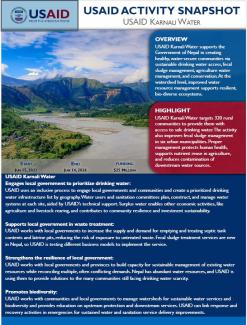START: JUN 15, 2021 | END: JUN 14, 2026 | FUNDING: $25 MILLION
OVERVIEW
USAID Karnali Water supports the Government of Nepal in creating healthy, water-secure communities via sustainable drinking water access, fecal sludge management, agriculture water management, and conservation. At the watershed level, improved water resource management supports resilient, bio-diverse ecosystems.
HIGHLIGHT
USAID Karnali Water targets 320 rural communities to provide them with access to safe drinking water. The activity also improves fecal sludge management in six urban municipalities. Proper management protects human health, supports nutrient reuse in agriculture, and reduces contamination of START downstream water sources.
USAID Karnali Water Engages local government to prioritize drinking water:
USAID uses an inclusive process to engage local governments and communities and create a prioritized drinking water infrastructure list by geography. Water users and sanitation committees plan, construct, and manage water systems at each site, aided by USAID’s technical support. Surplus water enables other economic activities, like agriculture and livestock rearing, and contributes to community resilience and investment sustainability.
Supports local government in waste treatment:
USAID works with local governments to increase the supply and demand for emptying and treating septic tank contents and latrine pits, reducing the risk of exposure to untreated waste. Fecal sludge treatment services are new in Nepal, so USAID is testing different business models to implement the service.
Strengthens the resilience of local government:
USAID works with local governments and provinces to build capacity for sustainable management of existing water resources while reconciling multiple, often conflicting demands. Nepal has abundant water resources, and USAID is using them to provide solutions to the many communities still facing drinking water scarcity.
Promotes biodiversity:
USAID works with communities and local governments to manage watersheds for sustainable water services and biodiversity and provides education on upstream protection and downstream services. USAID can link response and recovery activities in emergencies for sustained water and sanitation service delivery improvements.


